Palm vs. Soybean vs. Sunflower Oil: Which is Right for Your Manufacturing or HORECA Business?
Key Highlights:
- Market Outlook: The edible oils and fats market will grow from USD 464.5 billion in 2022 to USD 831.1 billion by 2030, creating opportunities for bulk buyers, HORECA, and manufacturers.
- Bulk Procurement:
- Palm Oil - Cost-efficient and ideal for large-scale frying and baking.
- Soybean Oil - Balanced pricing and versatile for food processing.
- Sunflower Oil - Premium choice for health-focused products.
- HORECA Applications:
- Palm oil ensures stability for frying and industrial use.
- Soybean oil suits neutral-flavor products and global brands.
- Sunflower oil appeals to premium and health-oriented menus.
- Trade & Supply:
- Palm oil from Indonesia/Malaysia offers predictable supply.
- Soybean oil from the US, Brazil, Argentina requires price monitoring.
- Sunflower oil from Ukraine, Russia, Argentina faces seasonal and geopolitical challenges.
- Strategic Fit:
- Palm Oil - Best for cost-sensitive, high-volume buyers.
- Soybean Oil - Balanced option for versatility and affordability.
- Sunflower Oil - Suited for premium positioning.
- Pro Tip: Bulk trade platforms like Tradologie.com provide verified suppliers, real-time pricing, and efficient procurement.
Introduction:
The global edible oils and fats market was valued at USD 464.5 billion in 2022 and is projected to reach USD 831.1 billion by 2030, growing at a CAGR of 7.5% from 2023 to 2030. For bulk buyers, manufacturers, and HORECA operators, this growth signals significant opportunities in sourcing and trading vegetable oils at scale. Palm, soybean, and sunflower oils remain the backbone of industrial production, offering diverse applications from processed foods to large-scale catering operations. For exporters and suppliers, aligning with these high-demand commodities ensures access to stable international markets and competitive pricing advantages.
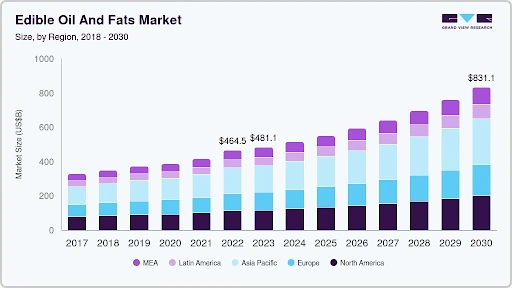
Bulk Procurement and Cost Considerations
Palm Oil: For B2B buyers, palm oil is often the go-to choice for bulk procurement due to its high yield and competitive pricing. Its cost-efficiency makes it ideal for restaurants, catering businesses, and food manufacturers managing high-volume frying, baking, and processed food production. The oil's high availability in global markets also ensures a stable supply chain for exporters and importers.
Soybean Oil: Soybean oil presents a balance between affordability and versatility. In markets where palm oil prices fluctuate, many HORECA businesses are switching to soybean oil for bulk purchases, especially for medium-heat cooking and manufacturing operations that demand neutral flavor profiles. B2B buyers should evaluate supplier reliability and global pricing trends to ensure consistent supply for industrial use.
Sunflower Oil: Sunflower oil is positioned as a premium bulk oil. While its procurement cost is higher than palm or soybean oil, it appeals to HORECA businesses and manufacturers focused on health-conscious offerings and high-value products. Bulk buyers must consider its lower yield and seasonal availability, which can affect pricing and delivery timelines.
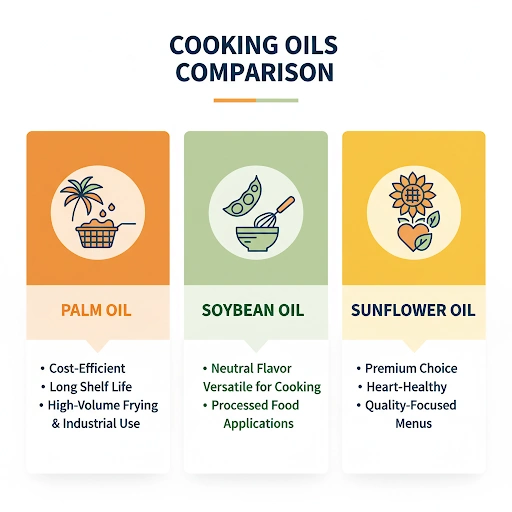
Industrial Cooking & HORECA Applications
Palm Oil: Thanks to its high smoke point and oxidative stability, palm oil is ideal for deep frying, commercial kitchens, and industrial baking. For hotels, restaurants, and large-scale caterers, palm oil ensures long-lasting quality and consistency in fried foods and packaged products. Its stability is particularly valuable for exporters supplying ready-to-eat or frozen foods.
Soybean Oil: Soybean oil works well for medium-heat cooking and frying applications, as well as for salad dressings and processed food manufacturing. While less stable than palm oil under prolonged heat, it is favored for products requiring a milder taste and neutral aroma, making it suitable for multinational HORECA chains and food brands exporting internationally.
Sunflower Oil: High-oleic sunflower oil is preferred in premium culinary applications. Its moderate smoke point makes it ideal for low- to medium-heat frying, sautéing, and dressings. HORECA buyers focused on health-oriented menus often opt for sunflower oil, despite the higher procurement cost, to align with international food trends emphasizing unsaturated fats and non-GMO sourcing.
Trade and Supply Chain Considerations
Palm Oil: Palm oil remains the most traded vegetable oil globally, with major production hubs in Indonesia and Malaysia. For B2B importers and exporters, it offers scalable logistics, competitive bulk pricing, and predictable delivery timelines. However, environmental and sustainability certifications (e.g., RSPO-certified palm oil) are increasingly required by international HORECA chains and institutional buyers.
Soybean Oil: Sourced primarily from the United States, Brazil, and Argentina, soybean oil is widely traded with increasing demand in industrial kitchens and manufacturing units. Bulk buyers in HORECA and processed food sectors must track global price volatility and work with reliable exporters to ensure uninterrupted supply.
Sunflower Oil: Ukraine, Russia, and Argentina are key exporters. For B2B trade, sunflower oil requires careful planning due to seasonal availability and geopolitical factors. HORECA businesses or manufacturers using sunflower oil for premium products often enter forward contracts or engage with specialized bulk suppliers to secure consistent supply.
Nutritional and Regulatory Considerations
Palm Oil: Despite being rich in saturated fats, palm oil remains compliant with most industrial standards for fried and processed foods. Exporters need to provide documentation for regulatory compliance in international markets, especially for packaged food sold in the EU and North America
Soybean Oil: Soybean oil's polyunsaturated fat profile makes it appealing to health-conscious HORECA buyers. It is widely accepted in global markets, but B2B buyers must be mindful of labeling regulations, particularly concerning allergens and genetically modified content.
Sunflower Oil: High-oleic sunflower oil is favored for health-oriented products. It complies with international standards for premium oils and is often marketed in high-end restaurants, hotels, and catering services targeting health-conscious consumers.
Making the Right Choice for Your Business
Selecting the right oil requires balancing cost, stability, availability, and health considerations:
- Palm Oil: Best for high-volume, cost-sensitive manufacturing and HORECA operations with intensive frying or industrial baking requirements.
- Soybean Oil: Suitable for medium-heat applications, neutral-flavored products, and manufacturers aiming for affordable bulk procurement with global availability.
- Sunflower Oil: Ideal for premium HORECA offerings and health-focused products, where product differentiation and nutritional appeal justify higher procurement costs.
B2B buyers should also consider supplier verification, certifications, and bulk trade platforms to ensure seamless procurement and compliance with international standards. Platforms like Tradologie.com offer verified exporters, real-time price discovery, and direct negotiations, enabling hotels, restaurants, and manufacturers to make informed bulk purchases efficiently.
Conclusion
For industrial kitchens, HORECA businesses, and food manufacturers, the choice between palm, soybean, and sunflower oils is not just about cooking—it's about optimizing costs, ensuring operational efficiency, and meeting international trade standards. Understanding each oil's yield, heat stability, nutritional profile, and supply chain dynamics is critical for making bulk procurement decisions that enhance product quality and profitability.
By aligning oil selection with production needs, market trends, and trade considerations, B2B buyers can maximize efficiency, reduce supply risks, and cater to evolving consumer preferences, positioning their business for success in a competitive global market.

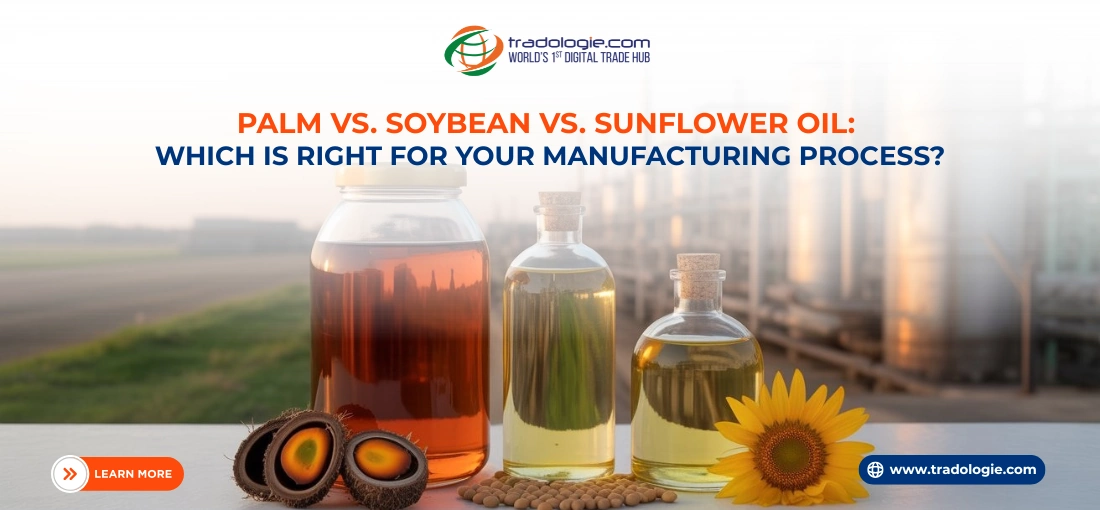
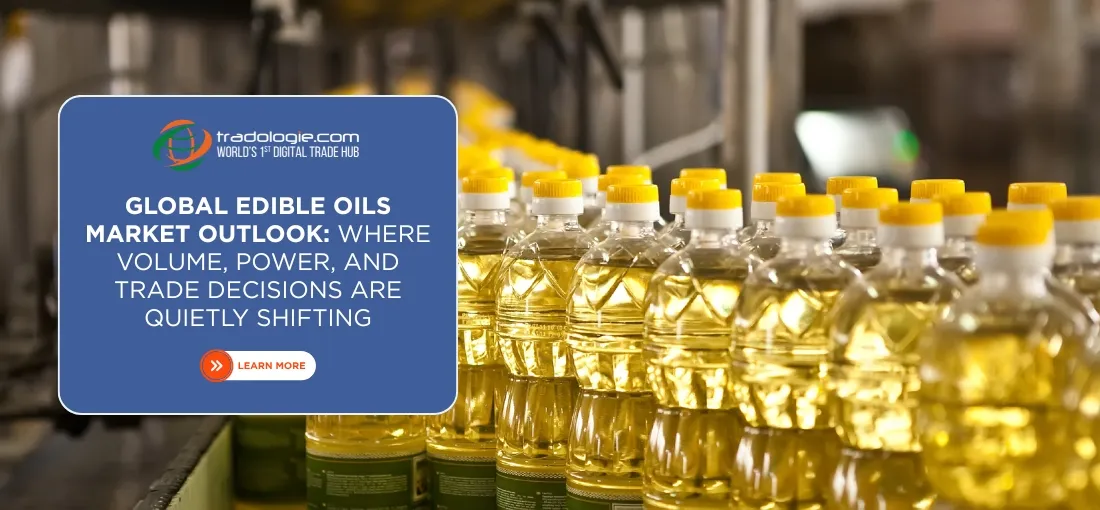
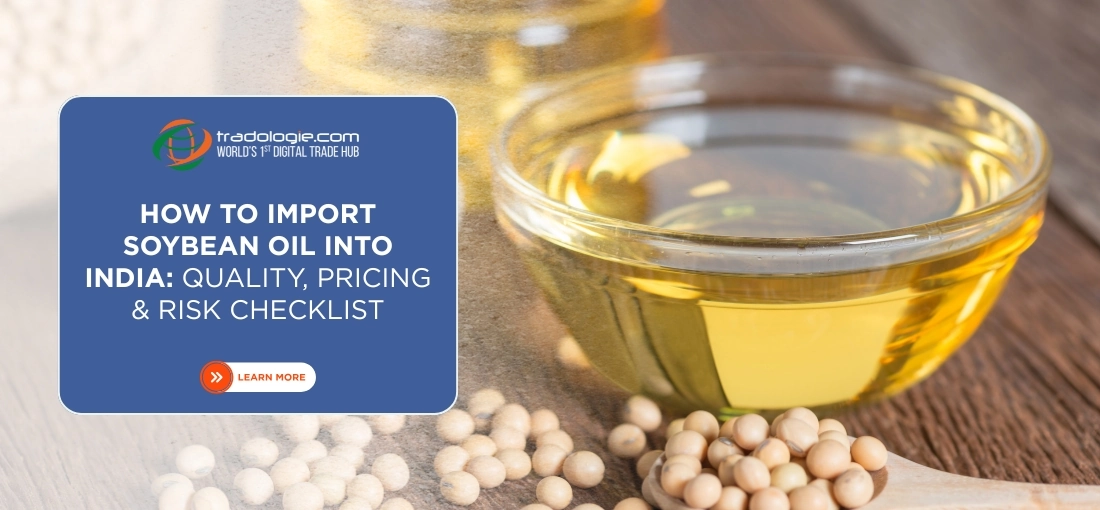
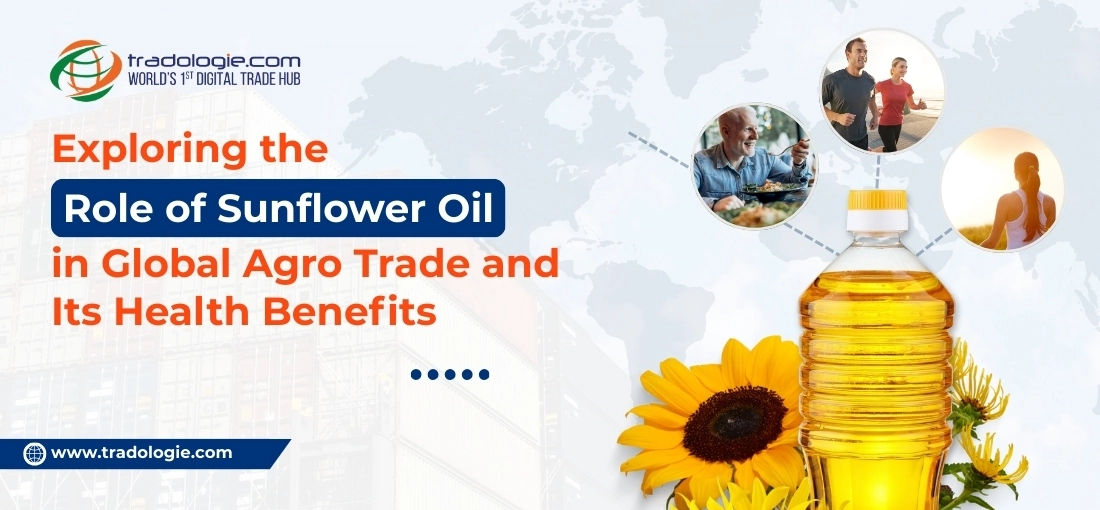
.webp)